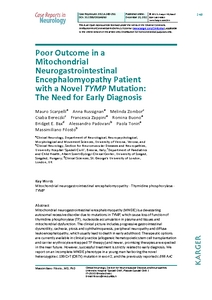Scarpelli, M; Russignan, A; Zombor, M; Bereczki, C; Zappini, F; Buono, R; Bax, BE; Padovani, A; Tonin, P; Filosto, M
(2012)
Poor Outcome in a Mitochondrial Neurogastrointestinal Encephalomyopathy Patient with a Novel TYMP Mutation: The Need for Early Diagnosis.
Case Rep Neurol, 4 (3).
248 - 253.
https://doi.org/10.1159/000346260
SGUL Authors: Bax, Bridget Elizabeth
![[img]](https://openaccess.sgul.ac.uk/101045/1.hassmallThumbnailVersion/crn-0004-0248.pdf)  Preview |
|
["document_typename_application/pdf; charset=binary" not defined]
Published Version
Download (837kB)
| Preview
|
Abstract
Mitochondrial neurogastrointestinal encephalomyopathy (MNGIE) is a devastating autosomal recessive disorder due to mutations in TYMP, which cause loss of function of thymidine phosphorylase (TP), nucleoside accumulation in plasma and tissues and mitochondrial dysfunction. The clinical picture includes progressive gastrointestinal dysmotility, cachexia, ptosis and ophthalmoparesis, peripheral neuropathy and diffuse leukoencephalopathy, which usually lead to death in early adulthood. Therapeutic options are currently available in clinical practice (allogeneic hematopoietic stem cell transplantation and carrier erythrocyte entrapped TP therapy) and newer, promising therapies are expected in the near future. However, successful treatment is strictly related to early diagnosis. We report on an incomplete MNGIE phenotype in a young man harboring the novel heterozygote c.199 C>T (Q67X) mutation in exon 2, and the previously reported c.866 A>C (E289A) mutation in exon 7 in TYMP. The correct diagnosis was achieved many years after the onset of symptoms and unfortunately, the patient died soon after diagnosis because of multiorgan failure due to severe malnutrition and cachexia before any therapeutic option could be tried. To date, early diagnosis is essential to ensure that patients have the opportunity to be treated. MNGIE should be suspected in all patients who present with both gastrointestinal and nervous system involvement, even if the classical complete phenotype is lacking.
Statistics
Item downloaded times since 30 Apr 2013.
Actions (login required)
 |
Edit Item |




